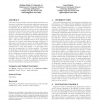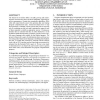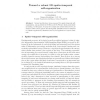50 search results - page 10 / 10 » Evolution at Learning: How to Promote Generalization |
KDD
2009
ACM
14 years 4 days ago
2009
ACM
There is a growing wealth of data describing networks of various types, including social networks, physical networks such as transportation or communication networks, and biologic...
CCS
2010
ACM
13 years 5 months ago
2010
ACM
We show in this paper how several proposed Physical Unclonable Functions (PUFs) can be broken by numerical modeling attacks. Given a set of challenge-response pairs (CRPs) of a PU...
ICSE
2010
IEEE-ACM
13 years 7 months ago
2010
IEEE-ACM
The feature list of modern IDEs is steadily growing and mastering these tools becomes more and more demanding, especially for novice programmers. Despite their remarkable capabili...
ESANN
2007
13 years 6 months ago
2007
Abstract. Several models have been proposed for spatio-temporal selforganization, among which the TOM model by Wiemer [1] is particularly promising. In this paper, we propose to ad...
JACM
2006
13 years 5 months ago
2006
"Experts algorithms" constitute a methodology for choosing actions repeatedly, when the rewards depend both on the choice of action and on the unknown current state of t...



